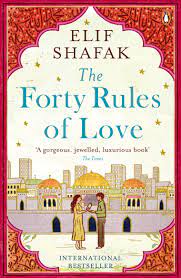The Forty Rules of Love - Elif Shafak - Review
The
forty rules of love refer to an approach in one's life when they encounter
painful and emotionally perplexing situations. I sense that the title
along with the front cover image can be misleading as these rules doesn't
restrict itself just within the nuptial relationship but cover a wide range of
relationship that a human is likely to face in his or her lifetime.
There
are two stories that runs in parallel, one of them narrates the relationship
between Rumi, well known Persian poet of the 13th century and a
dervish Shams-e Tabrizi while the second story narrates the unexpected
love affair between Ella, a 40 year old married women with 3 children and Aziz, a
modern day dervish of the 21st century.
Elif
Shafak tries to narrate the course of different events happening 7
centuries apart. While the social setup and personalities are an absolute
contrast between the two stories happening seven centuries across, the crux of
the storyline remains the same.
Now,
when Shams-e Tabrizi met Rumi, he was already an established and
respected Islamic Jurist, issuing fatwas while also giving sermons in the
mosques of Konya. Given this background, how did an unknown dervish Shams-e
Tabrizi get close to Rumi and what change did he bring about? Similar question
springs up between Ella, a settled mother of 3 children and Aziz. Am edging to
disclose more on the underlying context but didn’t want to play a spoilsport
for someone who is inclined to read the novel.
As
parallel narrative progresses, Elif picks her spot to elucidate the rules of
love one by one eventually disclosing the fortieth rule in the last chapter. I
have mentioned a few of them below:
“How
we see God is a reflection of how we see ourselves.”
“Most
of the problem of the world stem from linguistic mistakes and simple
misunderstandings. Don't ever take words at face value. When you step into the
zone of love, language as we know becomes obsolete.“
“A
Sufi is thankful not only for what has been given but also for all that has
been denied.“
“Eventually,
for the silk to survive, the silkworm had to die.”
“Every
true love and friendship is the story of an unexpected transformation. If we
are the same before and after we loved, that means we have not loved enough.”
Overall, the book was definitely engaging and I believe it’s bound to resonate more with those who are well aware of Rumi’s story and poems. For those who want to read, beware of a heavy heart in the end.


Comments